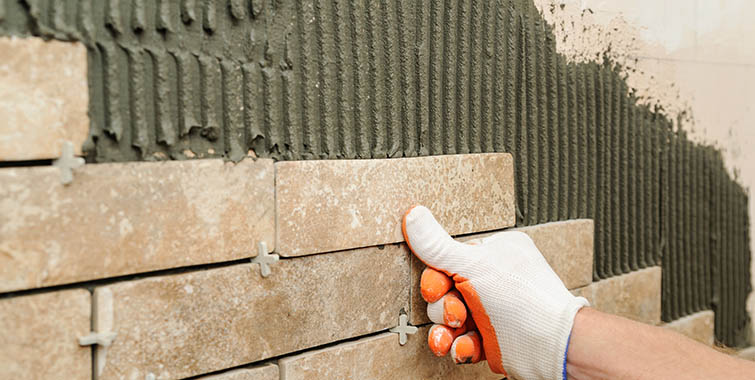As the old saying goes, mortar sticks and grout fills. In the case of ceramic tile, the mortar is what sticks the tile to the wall or floor. This article covers the various types of tile mortar on the market. Before reading this article, you may want to read our article Ceramic Tile - Thin-set vs Mud-set for a more thorough discussion about whether to use a thin-set or mud-set mortar bed.
Masonry mortar has different characteristics than tile mortar. If you are looking for information on masonry mortar, be sure to read our article: Masonry Mortar Types and Joints.

Unmodified Portland Cement (Dry-Set) Mortar
Unmodified thin-set mortar, sometimes called dry-set mortar, is comprised of Portland cement, sand, water retention agents, and water. The water retention agents help the ingredients hydrate when mixed with water and keeps the thin-set hydrated when it is troweled onto a dry tile. Thin-set mortars are applied to the substrate in a layer about 1/4" thick and the tiles are embedded into the mortar. Due to the thin layer, the tiles will follow the levelness of the substrate, but Portland cement mortars do offer some ability to compensate for imperfect substrates with a thicker layer of mortar.
Unmodified thin-set mortars are covered by ANSI Standard A118.1: American National Standard Specifications for Dry-Set Cement Mortar.
Latex-Portland Cement (Modified) Mortar
Modified thin-set mortars have the same ingredients as unmodified with the addition of a polymer that changes the composition of the mortar in a way that is advantageous during installation. The original modifier was latex, but that has generally been replaced by acrylic polymers. The modifiers help with various issues including: waterproofing, resistance to the freeze-thaw cycle, improved adhesion, or a more flexible setting bed that resists cracking when the substrate flexes. In general, the modifiers are a liquid that gets added to the dry ingredients instead of water, but some modifiers are included in the powered ingredients.
Modified mortars are covered by ANSI Standard A118.4 American National Standard Specifications for Modified Dry-Set Cement Mortar.
Epoxy Mortar
If high strength or chemical resistance is required, an epoxy mortar may be used. It is also useful for resin-backed stones like some marbles. Epoxy mortars are made from three components: a resin, a hardener, and silica sand. While the improved compressive strength and chemical resistance are great advantages, epoxy mortars set very quickly, are more expensive than Portland cement mortar, and have a very strong odor. Therefore, epoxy mortar is only used where necessary (commercial kitchens, corrosive environments, etc) and is usually installed by a professional.
Epoxy mortar is covered by ANSI Standard A118.3 American National Standard Specifications for Chemical Resistant, Water Cleanable Tile-Setting and -Grouting Epoxy and Water Cleanable Tile-Setting Epoxy Adhesive.
Tile Adhesives and Mastics
Tile adhesives are organic polymers that come in a premixed paste. They are applied with a trowel, much like thin-set mortar, but adhesives stick and hold better than mortar so the tiles are less likely to sag.
Tile adhesives have some drawbacks compared to thin-set mortar. Adhesives set as the polymers evaporate so they need access to air, which mean you'll have to use tiles smaller than 8". In addition, due to the organic compounds, tile adhesives should not be used where they are exposed to water. Water will cause the mortar to degrade quickly so adhesive is not recommended for bathrooms or kitchens. Finally, unlike mortar, adhesives cannot be used as a filler or leveler so the substrate must be flat or level.
Tile adhesives are covered by ANSI Standard A136.1 American National Standard Specifications for Organic Adhesives for Installation of Ceramic Tile.


